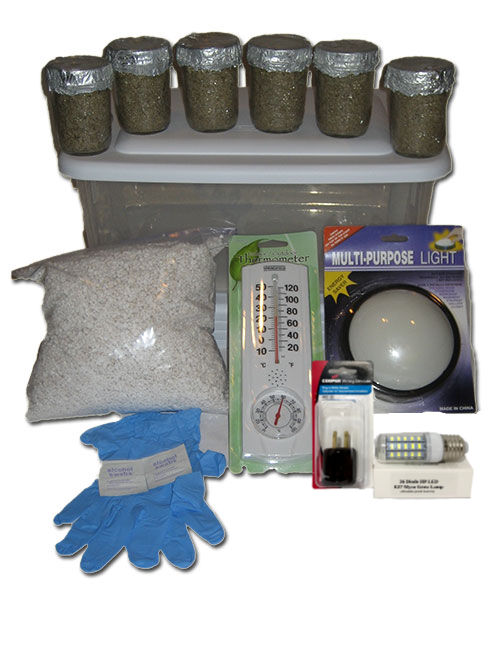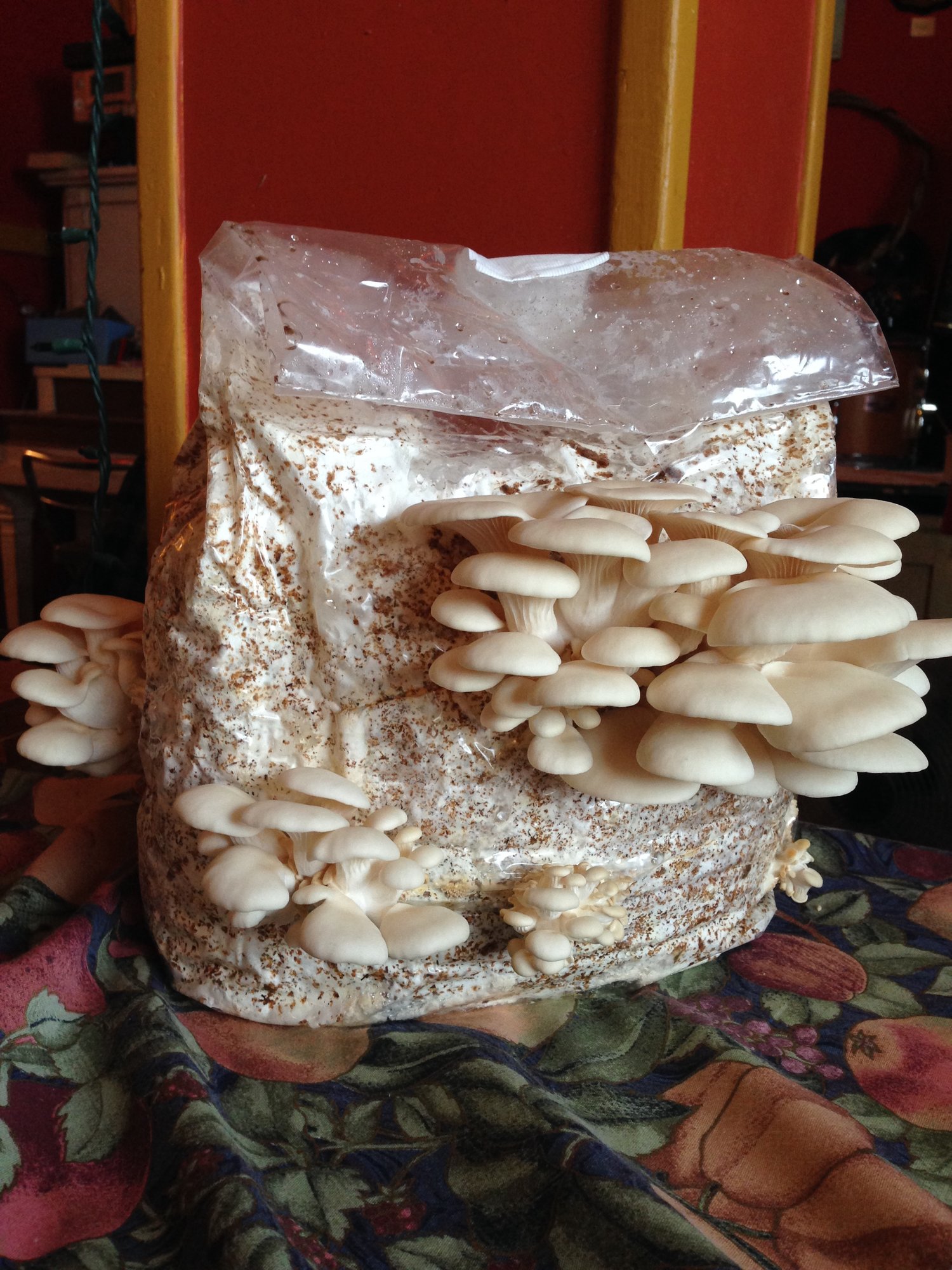This article was originally published on Psychedelic Spotlight and appears here with permission.
Growing mushrooms can be challenging, but mushroom grow kits can offer a simple solution. In this article, we'll tell you what you need to know before buying a mushroom grow kit.
If you're interested in growing mushrooms at home, whether for functional or psychedelic purposes, you may be intimidated by the steps involved in starting the process. From preparing the substrate to preventing contamination, the process can be arduous. Fortunately, mushroom grow kits can make your life easier, but you just have to know what to look out for before buying.
What Is A Mushroom Grow Kit?
A mushroom grow kit is a packaged product designed for cultivating mushrooms. It contains all the necessary materials required to grow mushrooms, including substrate, spores or spawn, and growing containers. Mushroom grow kits are specifically formulated to provide optimal growing conditions for different types of mushrooms, and they are typically easy to set up and use, making them a convenient option for both novice and experienced growers.
Photo of a mushroom grow kit. Source: Smugstown Mushrooms
One of the benefits of using a mushroom grow kit is that it simplifies the process of mushroom cultivation, making it accessible to beginners who may not have the knowledge or experience to create the ideal growing environment for mushrooms. Grow kits also offer a more controlled and predictable way to grow mushrooms, as the substrate and spores are already measured and prepared to the correct proportions.
Different mushroom grow kits are available for different types of mushrooms, and they may vary in terms of the yield, ease of use, and price. Some grow kits may also be specific to certain stages of the mushroom growth cycle, such as spawn kits for inoculating substrate or fruiting kits for promoting mushroom growth and fruiting. Ultimately, the right mushroom grow kit for you will depend on your preferences and the type of mushroom you want to grow.
What Kind Of Kit Should I Get?
When it comes to buying a mushroom grow kit, the type of mushroom you want to grow should be your top consideration. There are two main categories of mushrooms: functional and psychedelic. Functional mushrooms, such as shiitake, oyster, and portobello mushrooms, are popular for their health benefits and culinary uses. These mushrooms require different growing conditions and substrates compared to psychedelic mushrooms, such as Psilocybe cubensis, which are grown for their psychoactive compounds.
When selecting a functional mushroom grow kit, consider factors such as the desired yield, ease of use, and the type of substrate used. For example, shiitake mushrooms prefer hardwood sawdust as a substrate, while oyster mushrooms thrive on straw or coffee grounds. Each functional mushroom has its own unique growing requirements, and fortunately, mushroom grow kits take this into account to provide you an optimal yield.
On the other hand, if you're interested in growing psychedelic mushrooms, it's important to note that different strains of mushrooms have different growing requirements. One of the most popular strains of psychedelic mushrooms is Psilocybe cubensis, which requires a warm and humid environment for optimal growth, but is pretty forgiving, if these conditions are less than optimal. P. cubensis can also grow on a variety of easily-attainable substrates such as wild bird feed, rice, and vermiculite. Other strains, such as Psilocybe azurescens and Psilocybe cyanescens, require different substrates and growing conditions. Before purchasing a grow kit for a specific strain of psychedelic mushroom, make sure to do your research and ensure that the kit contains the right substrate and spores for that particular strain. Reputable sellers should provide you with the proper substrate and instruction for the strain you selected, but you should do your own research to make sure you understand what your mushroom of choice requires and be well-informed before starting the growing process.
What does a kit contain?

An example of what a mushroom grow kit can include. Source: Midwestgrowkits.com
A mushroom grow kit typically contains the following things to help you successfully cultivate mushrooms:
Inoculated substrate: This is the nutrient-rich material in which the mushroom mycelium grows. Common substrates include grain, sawdust, straw, or a combination of these materials. The substrate is usually sterilized and then inoculated with mushroom spores or mycelium to initiate growth. Sometimes, some mushroom grow kits are not inoculated and require the user to add spores – make sure you make sure you get the correct type of substrate.
Growing container or bag: The inoculated substrate is placed in a container or bag that provides the ideal environment for mushroom growth. Containers could be plastic boxes, jars, or specially designed mushroom grow bags with filter patches for air exchange.
Humidity and temperature control: Depending on the mushroom species you are cultivating, the kit may include a means to maintain appropriate humidity and temperature levels, such as a spray bottle for misting, a heat mat, or a thermometer and hygrometer.
Instructions: A detailed guide or manual explaining the setup and maintenance of the grow kit is essential, especially for beginners. This may include information on sterilization procedures, fruiting conditions, and harvest tips.
Protective gear: Some kits may come with gloves, face masks, or alcohol wipes to ensure sterility and prevent contamination during the inoculation and fruiting stages.
What Things Should I Be Wary Of Before Buying A Mushroom Grow Kit?
When purchasing a mushroom grow kit, there are several things to be wary of to ensure that you get a high-quality and successful product. First and foremost, it's important to ensure that the kit is sterilized to prevent contamination by bacteria or other fungi. Look for kits that are clearly labeled as sterilized and avoid using kits that appear dirty or have visible signs of mold or other contaminants.
Contaminated mushroom kit showing severe mold. Source: North Spore
If you are unsure of the sterility of the kit, read reviews and do research on the company or supplier before making a purchase. Browse forums like Reddit or Shroomery for reviews from other customers who have purchased the same kit to get an idea of the kit's quality and potential issues. Additionally, make sure to purchase from a reputable supplier that has a history of providing high-quality mushroom grow kits, again by checking forums. There are bound to be people who have bought from the website you are using, and if not, they will point you to a reputable seller instead.
Finally, when buying a mushroom grow kit, it's important to consider both the expected yield and ease of use. Some kits may be more complicated to set up and maintain, while others may be straightforward and offer higher yields. It's important to choose a kit that matches your skill level and the amount of time and effort you're willing to put into the cultivation process. If you're a beginner, it's advisable to start with a simpler mushroom variety and avoid more complex varieties that require precise temperature and humidity conditions.
What Are Some Beginner-Friendly Mushrooms To Grow?
When it comes to mushroom cultivation, some varieties are easier to grow than others. For beginners, it's recommended to start with a mushroom that is relatively easy to cultivate, such as oyster mushrooms, shiitake mushrooms, or white button mushrooms. These types of mushrooms have simple growing requirements and are generally more forgiving in terms of temperature and humidity fluctuations. They also tend to have a shorter growing cycle and produce relatively high yields.
As for psychedelic mushrooms, Psilocybe cubensis is the way to go, as they are easy for beginners to grow and pretty forgiving in terms of growing conditions. On the other hand, some mushrooms are more challenging to grow and may require more advanced skills and equipment. Examples of more difficult mushrooms to grow include maitake, lion’s mane, and chicken of the woods. These mushrooms require more precise growing conditions, specialized substrates, and have longer growing cycles. Some are mycorrhizal, which means mushrooms form a symbiotic relationship with the roots of a plant. An example of mycorrhizal mushrooms are chanterelles and hedgehogs, which require relationships with certain trees and plants, thus growing them at home can be near impossible.
In the psychedelic world, mushrooms like Enigma had been known to be hard to grow compared to a regular cube; it has even been said that you were required to be part of a private group dedicated to its cultivation before even attempting to grow it. A popular mushroom like the Penis Envy mushroom are also known to be a more challenging strain to grow compared to other varieties of Psilocybe cubensis mushrooms because of their slower growth rate, lower yields, and require more specific growing conditions compared to other strains. Other psychotropic species like Psilocybe azurescens, Psilocybe cyanescens, and Panaeolus cyanescens are also not beginner-friendly due to different temperature, humidity, and substrate requirements.
While it may be tempting to start with a more challenging mushroom variety, it's important to gain some experience with the easier varieties first to develop the necessary skills and knowledge. By starting with a beginner-level mushroom and gradually working your way up to more challenging varieties, you can develop your skills and experience and enjoy the rewards of successful mushroom cultivation at home. Be realistic with your expectations before starting.
In conclusion, mushroom grow kits can provide a convenient and accessible solution for cultivating mushrooms at home, whether for culinary, functional, or psychedelic purposes. Before purchasing a kit, it's essential to consider the mushroom species and strain you want to grow, the contents and quality of the kit, and the cultivation difficulty of the mushroom. Beginners should start with easy-to-grow varieties and gradually progress to more challenging species as their skills and experience develop. By keeping these factors in mind, you can confidently embark on your mushroom cultivation journey with the right grow kit tailored to your needs.
© 2025 Benzinga.com. Benzinga does not provide investment advice. All rights reserved.
Trade confidently with insights and alerts from analyst ratings, free reports and breaking news that affects the stocks you care about.
Cannabis is evolving—don’t get left behind!
Curious about what’s next for the industry and how to stay ahead in today’s competitive market?
Join top executives, investors, and industry leaders at the Benzinga Cannabis Capital Conference in Chicago on June 9-10. Dive deep into market-shaping strategies, investment trends, and brand-building insights that will define the future of cannabis.
Secure your spot now before prices go up—this is where the biggest deals and connections happen!
